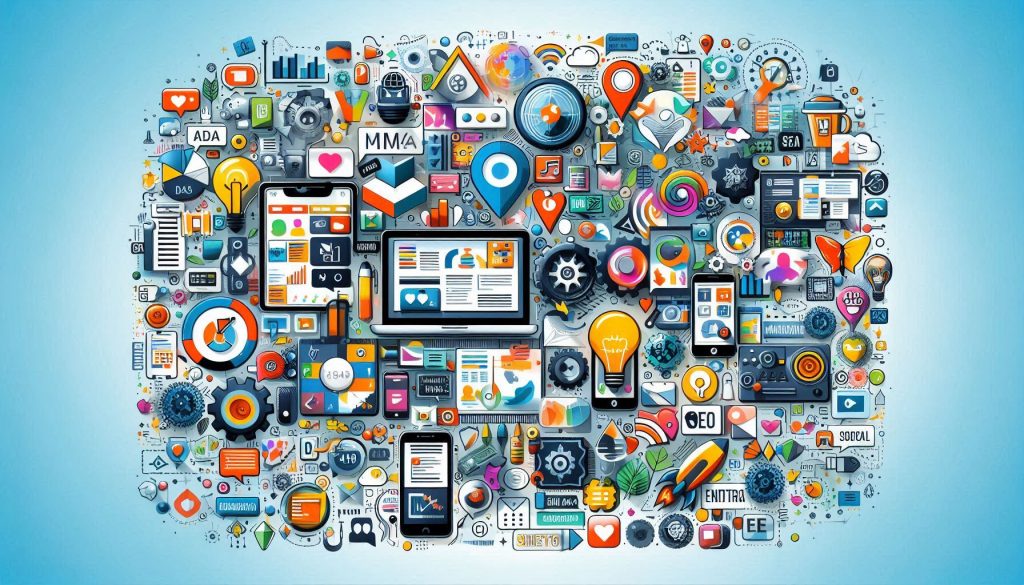Digital media marketing is the practice of promoting brands using online platforms and channels. It involves leveraging digital technologies to reach and engage with target audiences effectively.
In today’s fast-paced digital landscape, businesses are increasingly turning to digital media marketing as a key strategy to connect with their customers in a more personalized and impactful way. By harnessing the power of social media, search engines, email, and other online platforms, companies can boost brand awareness, drive website traffic, generate leads, and ultimately increase sales.
Understanding the nuances of digital media marketing is essential for any modern business looking to stay competitive and relevant in the digital age. Let’s delve deeper into the world of digital media marketing and explore its key components and benefits.
The Evolution Of Marketing
Marketing has come a long way from traditional methods to the digital age. With the advent of technology and the internet, the landscape of marketing has undergone a significant transformation. This evolution has led to the rise of digital media marketing, which has revolutionized the way businesses connect with their target audience.
Traditional Vs. Digital Marketing
In the past, traditional marketing relied heavily on print advertisements, television commercials, and billboards to reach consumers. While these methods were effective, they were limited in terms of reach and targeting.
On the other hand, digital marketing leverages online platforms such as social media, search engines, and email to engage with potential customers. This shift has empowered businesses to target specific demographics and track the effectiveness of their marketing efforts in real time.
Rise Of Digital Media Marketing
The rise of digital media marketing can be attributed to the increasing reliance on the internet and mobile devices for information and entertainment. As consumers spend more time online, businesses have recognized the need to establish a strong digital presence to remain competitive. Digital media marketing offers unparalleled opportunities for engagement, personalization, and data-driven decision-making, making it a vital component of any modern marketing strategy.
Understanding Digital Media Marketing
Digital media marketing refers to the use of digital channels and platforms to promote products, services, and brands. It involves utilizing various online tools and technologies to reach and engage with a target audience. Understanding digital media marketing is essential for businesses to effectively connect with their customers in the digital space.
Definition and Scope
Digital media marketing encompasses the strategic use of digital channels such as social media, websites, search engines, email, and mobile apps to connect with current and potential customers. It involves creating and sharing valuable content, engaging with the audience, and ultimately driving desired actions such as purchases or brand loyalty. The scope of digital media marketing is vast, covering a wide range of tactics and strategies to achieve marketing objectives in the online realm.
Key Components
The key components of digital media marketing include content marketing, search engine optimization (SEO), social media marketing, email marketing, pay-per-click advertising (PPC), influencer marketing, and online reputation management. Each of these components plays a crucial role in creating a comprehensive digital media marketing strategy that effectively reaches and engages the target audience.
Importance Of Digital Media Marketing
Digital media marketing plays a crucial role in today’s business landscape. It enables companies to connect with their target audience, build brand awareness, and drive engagement. By leveraging various digital channels, businesses can reach their customers in a more personalized and effective manner.
Reaching Target Audience
Digital media marketing allows businesses to precisely target their ideal customers based on demographics, interests, and online behavior. This targeted approach ensures that marketing efforts are directed towards those most likely to convert, resulting in a higher return on investment.
Building Brand Awareness
Through digital media marketing, brands can consistently engage with their audience across various online platforms. This continuous interaction helps in establishing brand recognition and loyalty, ultimately leading to increased sales and customer retention.
Strategies For Effective Digital Media Marketing
Content Marketing
Digital media marketing relies heavily on content marketing to engage and attract audiences. Creating valuable and relevant content is crucial for capturing the attention of potential customers and building brand loyalty.
It includes blog posts, videos, infographics, and other forms of content that provide valuable information to the target audience. By consistently producing high-quality content, businesses can establish themselves as industry leaders and build trust with their audience.
Social Media Engagement
Utilizing social media engagement is an essential strategy for digital media marketing. Engaging with followers through posts, comments, and direct messages helps build a sense of community and trust.
Businesses can leverage social media to share content, run promotions, and interact with their audience in real-time. By maintaining an active and responsive presence on social platforms, companies can effectively reach and connect with their target demographic.
Tools and Technologies
When it comes to digital media marketing, the tools and technologies utilized play a crucial role in driving success. Let’s explore two key aspects: SEO and SEM, and Analytics and Tracking.
SEO and SEM
Search engine optimization (SEO) and search engine marketing (SEM) are vital tools for enhancing online visibility and driving traffic.
Analytics And Tracking
Analytics and tracking tools are essential for measuring the effectiveness of digital marketing campaigns and optimizing strategies.
Mastering Digital Media Marketing
Creating Engaging Content
Engaging content is key to capturing your audience’s attention. Use visuals, videos, and interactive elements.
Optimizing Conversion Rates
Conversion rates can be improved by A/B testing, optimizing landing pages, and analyzing data to make informed decisions.
Digital media marketing involves harnessing online platforms to promote products or services. It’s crucial to understand your target audience and tailor your strategies accordingly. Consistent branding across all channels helps build trust.
Quality content resonates with users, driving engagement and conversions. Utilize SEO techniques to boost visibility. Social media is a powerful tool for reaching a wider audience.
Success Stories
Success stories in digital media marketing exemplify the power of strategic, well-executed campaigns. These stories showcase the impact and effectiveness of various digital marketing tactics, providing valuable insights and inspiration for businesses seeking to achieve similar success.
Case Studies Of Effective Campaigns
One of the most compelling success stories in digital media marketing is the case of Company X, which implemented a targeted social media advertising campaign. By leveraging precise audience targeting and engaging ad creatives, Company X achieved a 200% increase in lead generation and a 150% boost in online sales within just three months.
Another remarkable case study is the success of Company Y’s influencer marketing campaign. By collaborating with popular social media influencers, Company Y saw a 300% surge in brand awareness and a 40% rise in customer engagement, leading to a substantial increase in overall revenue.
Lessons Learned
- Personalization and targeted advertising can significantly enhance campaign performance.
- Influencer partnerships can yield impressive results in terms of brand visibility and customer engagement.
- Consistent, compelling storytelling across digital platforms can foster a strong emotional connection with the target audience.
Future Trends In Digital Media Marketing
Discover the latest trends in digital media marketing, a dynamic landscape leveraging online platforms to engage audiences. Digital media marketing encompasses strategies like social media advertising, influencer partnerships, and content creation to boost brand visibility and drive conversions. Stay ahead in the digital realm by embracing innovative approaches and adapting to evolving consumer behaviors.
Digital media marketing is a constantly evolving field, and staying up-to-date with the latest trends is crucial for businesses to remain competitive. As technology advances, so do the ways in which businesses can reach their target audience. In this blog post, we will explore the future trends in digital media marketing, including AI and automation, personalization, and customer experience.
Ai and Automation
Artificial intelligence (AI) and automation are revolutionizing digital media marketing. These technologies can analyze vast amounts of data to provide valuable insights that can help businesses make informed decisions. AI-powered chatbots can also improve customer experience by providing personalized support around the clock.
Personalization and Customer Experience
Personalization is becoming increasingly important in digital media marketing. Customers want to feel understood and valued by the brands they interact with. By using data analytics and AI, businesses can create personalized marketing campaigns that speak directly to their target audience. This can lead to increased customer loyalty and satisfaction.
Html Syntax Example:
| Trend | Description |
| AI and Automation | AI and automation are revolutionizing digital media marketing. |
| Personalization and Customer Experience | Personalization is becoming increasingly important in digital media marketing. |
In conclusion, as technology continues to advance, businesses must adapt to the latest trends in digital media marketing to stay ahead of the competition. By utilizing AI and automation, personalization, and improving customer experience, businesses can create effective and engaging marketing campaigns that resonate with their target audience.
Frequently Asked Questions
What Is Digital Marketing Media?
Digital marketing media refers to online platforms and tools used for promoting products or services. It includes websites, social media, email, and search engines for advertising and engaging with target audiences.
What Are The Four Types Of Digital Marketing?
The four types of digital marketing are search engine optimization (SEO), pay-per-click advertising (PPC), social media marketing, and content marketing. SEO involves optimizing websites to rank higher in search engine results. PPC uses paid advertising to drive traffic to websites.
Social media marketing involves promoting products or services on social media platforms. Content marketing involves creating and sharing valuable content to attract and retain customers.
Is Digital Marketing A Good Career?
Yes, digital marketing is a good career choice due to its high demand, diverse opportunities, and potential for growth. It offers a chance to be creative, work with cutting-edge technology, and make a significant impact in the ever-evolving digital landscape.
What Is The Salary Of A Digital Marketer?
A digital marketer’s salary varies based on experience and location, ranging from $40,000 to $100,000 annually.
Conclusion
Digital media marketing is an ever-evolving industry that enables businesses to reach a wider audience and create a strong online presence. By utilizing various digital channels such as social media, search engines, and email, companies can target their ideal customers with personalized and relevant content.
It is crucial for businesses to stay up-to-date with the latest trends and techniques in digital media marketing to remain competitive in today’s market. By implementing effective digital marketing strategies, businesses can increase their brand awareness, engagement, and ultimately drive conversions.

